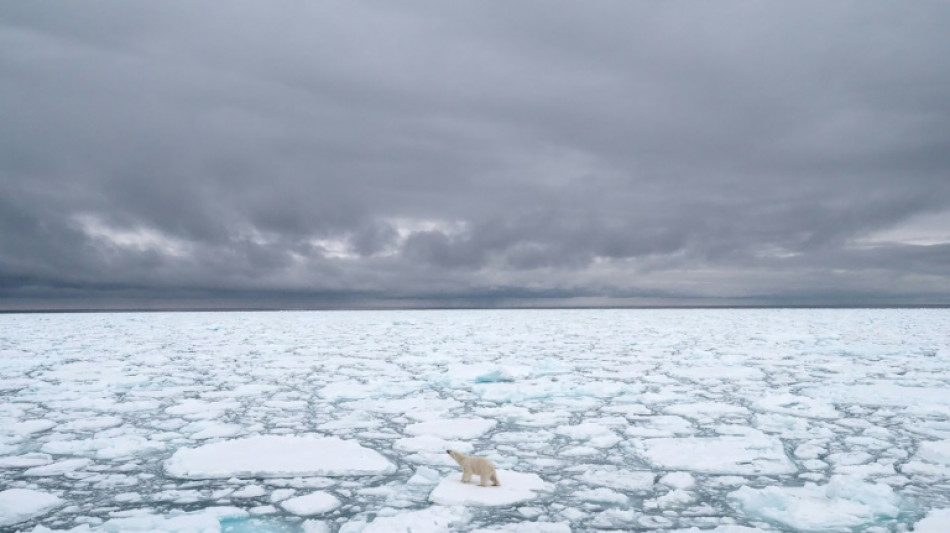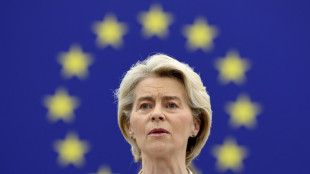
-
 Europe Ryder Cup captain Donald has given players no assurances
Europe Ryder Cup captain Donald has given players no assurances
-
Trump drug price plan could nix investment, warns Roche

-
 Tom Cruise unleashes 'Mission: Impossible' at Cannes
Tom Cruise unleashes 'Mission: Impossible' at Cannes
-
Trump admin weakens limits on 'forever chemicals' in drinking water

-
 Paris to allow swimming in Seine from July in Olympic legacy
Paris to allow swimming in Seine from July in Olympic legacy
-
Germany's Merz urges Europe-US unity on Ukraine war

-
 Tom Cruise nearly met his end on 'The Final Reckoning'
Tom Cruise nearly met his end on 'The Final Reckoning'
-
No new burdens for McIlroy, living the dream after career Slam

-
 Sean Combs's ex Cassie to face defense grilling at second day in court
Sean Combs's ex Cassie to face defense grilling at second day in court
-
Ageless beauty contest: South African grannies strut the catwalk

-
 Trump says 'possibility' of meeting Putin for Ukraine talks in Turkey
Trump says 'possibility' of meeting Putin for Ukraine talks in Turkey
-
Gauff sees off Andreeva to reach Italian Open semis

-
 Merz vows to rev up German economic 'growth engine'
Merz vows to rev up German economic 'growth engine'
-
Strikes kill 29 in Gaza, amid hostage release talks

-
 Tennis champ Sinner meets Pope Leo, offers quick rally
Tennis champ Sinner meets Pope Leo, offers quick rally
-
England sees driest spring since 1956: government agency

-
 Trump presses Syria leader on Israel ties after lifting sanctions
Trump presses Syria leader on Israel ties after lifting sanctions
-
Rare blue diamond fetches $21.5 mn at auction in Geneva

-
 Stock markets fluctuate as China-US trade euphoria fades
Stock markets fluctuate as China-US trade euphoria fades
-
Ousted Myanmar envoy charged with trespass in London residence row

-
 Russia jails prominent vote monitor for five years
Russia jails prominent vote monitor for five years
-
Umbro owner in joint bid for Le Coq Sportif

-
 Tom Cruise has world guessing as he unleashes 'Mission: Impossible' at Cannes
Tom Cruise has world guessing as he unleashes 'Mission: Impossible' at Cannes
-
China's Tencent posts forecast-beating Q1 revenue on gaming growth

-
 Trump presses Syria leader on Israel relations after lifting sanctions
Trump presses Syria leader on Israel relations after lifting sanctions
-
FA appoint former Man Utd sporting director Dan Ashworth as chief football officer

-
 Stop holding opponents incommunicado, UN experts tell Venezuela
Stop holding opponents incommunicado, UN experts tell Venezuela
-
Indonesian filmmakers aim to impress at Cannes

-
 Trump presses Syria leader on Israel after lifting sanctions
Trump presses Syria leader on Israel after lifting sanctions
-
French PM to testify on child abuse scandal

-
 Players stuck in middle with IPL, national teams on collision course
Players stuck in middle with IPL, national teams on collision course
-
Peru PM quits ahead of no-confidence vote

-
 Strikes kill 29 in Gaza as hostage release talks ongoing
Strikes kill 29 in Gaza as hostage release talks ongoing
-
Court raps Brussels for lack of transparency on von der Leyen vaccine texts

-
 France summons cryptocurrency businesses after kidnappings
France summons cryptocurrency businesses after kidnappings
-
Pakistan returns Indian border guard captured after Kashmir attack

-
 Baidu plans self-driving taxi tests in Europe this year
Baidu plans self-driving taxi tests in Europe this year
-
Trump meets new Syria leader after lifting sanctions

-
 Equity markets swing as China-US trade euphoria fades
Equity markets swing as China-US trade euphoria fades
-
Burberry warns 1,700 jobs at risk after annual loss

-
 Trump to meet new Syrian leader after offering sanctions relief
Trump to meet new Syrian leader after offering sanctions relief
-
'Children are innocent': Myanmar families in grief after school air strike

-
 Colombia joins Belt and Road initiative as China courts Latin America
Colombia joins Belt and Road initiative as China courts Latin America
-
Australian champion cyclist Dennis gets suspended sentence after wife's road death

-
 Protection racket? Asian semiconductor giants fear looming tariffs
Protection racket? Asian semiconductor giants fear looming tariffs
-
S. Korea Starbucks in a froth over presidential candidates names

-
 NATO hatches deal on higher spending to keep Trump happy
NATO hatches deal on higher spending to keep Trump happy
-
Eurovision stage a dynamic 3D 'playground': producer

-
 Cruise unleashes 'Mission: Impossible' juggernaut at Cannes
Cruise unleashes 'Mission: Impossible' juggernaut at Cannes
-
Suaalii in race to be fit for Lions Tests after fracturing jaw

| CMSD | -0.13% | 22.36 | $ | |
| GSK | 0.16% | 36.41 | $ | |
| CMSC | 0.05% | 22.07 | $ | |
| RBGPF | 1.27% | 63.81 | $ | |
| SCS | -1.23% | 10.58 | $ | |
| NGG | -0.15% | 67.43 | $ | |
| BTI | -0.61% | 40.445 | $ | |
| RELX | 1.41% | 53.15 | $ | |
| RIO | -0.16% | 62.171 | $ | |
| BCC | -1.41% | 92.405 | $ | |
| RYCEF | -0.19% | 10.68 | $ | |
| AZN | -1.26% | 66.88 | $ | |
| JRI | -0.36% | 12.834 | $ | |
| VOD | -0.11% | 9.05 | $ | |
| BP | -0.64% | 30.365 | $ | |
| BCE | -2.85% | 21.37 | $ |

World's sea ice cover hits record low in February
Global sea ice cover fell to a historic low in February when the world continued to experience exceptional heat and temperatures reached 11 degrees Celsius above average near the North Pole, Europe's climate monitor said on Thursday.
The Copernicus Climate Change Service said last month was the third hottest February on record, continuing a run of persistent warming since 2023 stoked by greenhouse gas emissions.
Combined Antarctic and Arctic sea ice cover -- ocean water that freezes and floats on the surface -- dropped to a record minimum extent of 16.04 million square kilometres (6.19 million square miles) on February 7, Copernicus said.
"February 2025 continues the streak of record or near-record temperatures observed throughout the last two years," said Samantha Burgess of the European Centre for Medium-Range Weather Forecasts, which runs Copernicus.
"One of the consequences of a warmer world is melting sea ice, and the record or near-record low sea ice cover at both poles has pushed global sea ice cover to an all-time minimum."
The poles are the most sensitive regions to climate change on the planet, warming several times faster than the global average.
Arctic ice cover, which normally expands to its annual winter maximum in March, was a historic February low last month, eight percent below average, Copernicus said. That marked the third monthly record in a row.
In the Antarctic, where it is now summer and the ice is melting, the frozen cover was 26 percent below average across February, it said.
The Antarctic region may have hit its annual low point towards the end of the month, Copernicus said, adding that if confirmed this would be the second-lowest daily minimum coverage in the satellite record.
- 'Serious concern' -
Decreased ice cover does not affect sea levels because the ice is already floating in the water but its retreat has serious impacts on weather patterns, global climate, ocean currents, people and ecosystems.
When highly reflective snow and ice give way to dark blue ocean, energy from the sun that would have bounced back into space is absorbed by the water instead, raising the water's temperature and triggering a cycle of ice melt and further global warming.
Melting sea ice in the Arctic is opening up new shipping routes and attracting geopolitical attention, including from US President Donald Trump who has said that he wants to take control of Greenland, a Danish autonomous territory.
The loss of polar ice is a danger for a large number of animals for whom it provides shelter, breeding and hunting grounds, including polar bears, seals and, in Antarctica, penguins.
"The current record low global sea ice extent revealed by the Copernicus analysis is of serious concern as it reflects major changes in both the Arctic and Antarctic," said Simon Josey, Professor of Oceanography at the UK's National Oceanography Centre.
He added that warm ocean and atmospheric temperatures "may lead to an extensive failure of the ice to regrow" in the Antarctic during the southern hemisphere winter.
Oceans store 90 percent of the excess heat trapped in the atmosphere by greenhouse gases, which are largely caused by human activity, including the burning fossil fuels like oil, coal and gas.
Sea surface temperatures have been exceptionally warm over 2023 and 2024, and Copernicus said readings in February were the second highest on record for that month.
Globally, February was 1.59C hotter than pre-industrial times, the agency said.
- Heat streak -
While temperatures were below average last month over parts of North America, Eastern Europe and large areas of eastern Asia, it was hotter than average over northern Chile and Argentina, western Australia, the southwestern United States and Mexico.
Temperatures were particularly elevated north of the Arctic Circle in February, averaging 4C above the 1991–2020 reference period, Copernicus said.
One area near the North Pole was 11C (around 20 degrees Fahrenheit) hotter than average over the month.
Copernicus uses satellite observations of polar regions going back to the 1970s and shipping records before that.
Climate scientists had expected the exceptional heat spell across the world to subside after a warming El Nino event peaked in January 2024 and conditions gradually shifted to a cooling La Nina phase.
But last year was the hottest in recorded history and the United Nations' World Meteorological Organization said on Thursday the La Nina phase was "weak" and likely to be brief.
In the 20 months since mid-2023, only July 2024 dipped below 1.5C of warming, Copernicus said.
This has raised concerns that it will be almost impossible to keep the pledge that world leaders made in the 2015 Paris Agreement to stop the planet's long-term average temperature from rising more than 1.5C above pre-industrial levels.
Copernicus uses billions of measurements from satellites, ships, aircraft and weather stations to aid its climate calculations, with records going back to 1940.
Other sources of climate data -- such as ice cores, tree rings and coral skeletons -- have allowed scientists to say that the current period is likely to be the warmest the Earth has been for the last 125,000 years.
F.Wagner--VB

